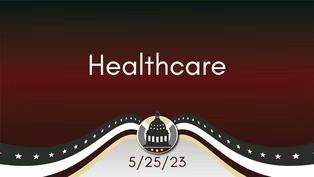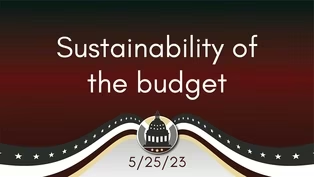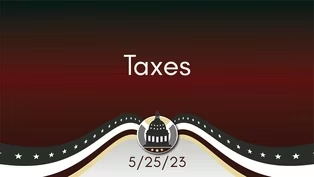Your Legislators
Higher Education 5/25/23
Clip: Season 43 Episode 12 | 9m 40sVideo has Closed Captions
Host Barry Anderson and guests discuss higher education.
Host Barry Anderson and guests discuss higher education. Guests this episode: Sen. Mary Kunesh (DFL), District 39, New Brighton, Assistant Majority Leader; Sen. Zach Duckworth (R), District 57, Lakeville, Assistant Minority Leader; Rep. Jamie Long (DFL), District 61B, Minneapolis, Majority Leader; and Rep. Spencer Igo (R), District 07A, Wabana Township, Assistant Minority Leader
Problems playing video? | Closed Captioning Feedback
Problems playing video? | Closed Captioning Feedback
Your Legislators is a local public television program presented by Pioneer PBS
This program is produced by Pioneer PBS and made possible by Minnesota Corn, Minnesota Farmers Union and viewers like you.
Your Legislators
Higher Education 5/25/23
Clip: Season 43 Episode 12 | 9m 40sVideo has Closed Captions
Host Barry Anderson and guests discuss higher education. Guests this episode: Sen. Mary Kunesh (DFL), District 39, New Brighton, Assistant Majority Leader; Sen. Zach Duckworth (R), District 57, Lakeville, Assistant Minority Leader; Rep. Jamie Long (DFL), District 61B, Minneapolis, Majority Leader; and Rep. Spencer Igo (R), District 07A, Wabana Township, Assistant Minority Leader
Problems playing video? | Closed Captioning Feedback
How to Watch Your Legislators
Your Legislators is available to stream on pbs.org and the free PBS App, available on iPhone, Apple TV, Android TV, Android smartphones, Amazon Fire TV, Amazon Fire Tablet, Roku, Samsung Smart TV, and Vizio.
Buy Now
Providing Support for PBS.org
Learn Moreabout PBS online sponsorship- Senator Kunesh, we began this evening.
You talked a little bit about education.
I'd like to talk a little bit about higher education and how that fared in this session.
The governor has already hinted at or suggested that, well anyway, let me just give you the floor to talk a little bit about what transpired in higher education.
We do have this question of what we're going to do with the university hospital and some of these questions, but that maybe is more a healthcare question than higher ed.
Let's talk about higher ed start.
Senator Kunesh, your thoughts on that.
- Well, we know that many of our, our post high school students have been, has struggled to be able to afford school.
And it's not just that tuition, but it's the cost of going to school, feeding, you know, the feeding those kids, the books and all of those sort of things.
So we know that when we start to invest in that level of education, those are the kids that are gonna stay, whether they come from outta state or they're instate.
If they have a good college experience, they're gonna stay here and do the work that we're gonna need them to do.
So the 4 billion plus higher ed bill that was passed this session that includes funding for free public college for students from, students that are coming from families that make less than $80,000 per year, I believe is going to make a big difference as we go forward.
The cost has just been, you know, the loans that kids have had to take in order to complete their education has been just a burden.
And so within the K-12 education, we have loan forgiveness and it's just really important that as we look forward, especially with the University of Minnesota and our land grant colleges, that we are continuing to invest in those areas.
And I'm just really proud that we were able to do that in a level that we were, and so very proud of the work that we did for higher ed.
- Senator, just to follow up on that, your legislative colleague Gene Pelowski, been on our program not only this time, but many times in previous years, and he's expressed concern about declining enrollments and declining applications at the higher education level.
Any thoughts on that as it relates to action taking this session?
- Well, I would imagine that we will see, and I would hope that we would see an increase in enrollment across the state, especially those low income families and our BIPOC communities that have found the cost of going to university so prohibitive that they haven't had that opportunity to get the higher learning, the skills that are going to allow them to increase their income and contribute towards the good of Minnesota, whether through jobs, through their experience, their expertise, and their taxes.
And I think what we'll see, just a really positive side effect of this tuition free college for those that need it the most.
- Senator Duckworth, higher education.
- Well, I think higher education is one of the best examples of people actually sitting around their kitchen table and looking at their home budget.
It was kind of referenced that the state of Minnesota was maybe, you know, looking at our budget as if we were a homeowner.
And I think the one advantage that the state has that Minnesotans don't have is Minnesotans can't just raise taxes and reach into the pockets of their neighbors to pay for all the good ideas and programs that they want to do.
That's the biggest difference.
And a surplus should never be looked at as a bonus, by any means.
This is not a bonus that the state has over collected taxpayer dollars and removed it from them and their ability to use it on their families or loved ones and their futures.
And I think when we look at this program in particular as it relates to higher education in college, you've got a lot of Minnesotans out there saying, I would love the chance and the opportunity to save and pay for my child's higher education before the state requires me and forces me to pay for that of others.
And when you look at what this program's gonna do long run is sure it may subsidize higher education for some, you know, I think many could argue that's a good thing, but it's gonna come at a cost to tuition overall being raised on everyone else.
That's the most significant issue at public institutions anyway.
We had a state grant program we could have chosen to fund instead, which would've benefited a lot more students and families and institutions and colleges all across the state rather than being very segmented.
I think what you're gonna see happen is you're gonna see a lot of colleges or public institutions continue to raise their tuition because we didn't actually go about trying to solve the problem, which was how do we help these institutions continue to drive tuition rates down and make it more affordable for folks.
That's part of the enrollment issue.
And if we know that this is gonna continue to increase the costs of tuition, well, we're of course potentially gonna have an impact on enrollment as well.
So I think that's the holistic picture we have to be mindful of when it comes to higher education here in the state of Minnesota and why kids and families are or are not choosing to pursue it.
- Representative Long, higher education.
- Thank you.
Well, I think Senator Duckworth has it backwards.
I think that we have seen the higher education burden shift dramatically towards putting the cost of higher education on students.
20 years ago, the way that we paid for higher education was about 70% state, about 30% students.
And that has flipped.
Now, we're putting 70% of the cost of higher education on our students and that means that a lot of families can't afford to go to college, which is why you're seeing on the enrollment declines that we're seeing in this state that has huge impacts on our overall economy.
We're seeing jobs go unfilled because folks don't have the skills that they need and our higher education is one of the main ways that they can get those skills.
We're also seeing students take on huge amounts of debt and delaying starting families, delaying buying homes, delaying all of the things that help our economy be productive because they're not able to get a good, affordable, higher education.
And this budget makes a really important step in that direction.
We are freezing tuition for all Minnesota state schools for the next two years in this.
And we are, as Senator Kunesh mentioned, paying for the tuition for families that make under $80,000 a year.
That is something that red states and blue states do across the country.
It's a bipartisan approach and it is hugely successful around the country to help students get access to that good higher education, which can be life changing and launch them into new careers.
We've heard from our colleagues on this program that folks are leaving the state, but they haven't told you why they're leaving the state.
It's not wealthy people because of taxation, it's young people, the folks in their twenties are the ones who are leaving the state when you look at the actual data and they're leaving the state because they're going to college in other states and they're staying.
They aren't able to afford college here and they don't see our state being affordable.
So the investments that we're making in higher education and helping folks who want to start families here, afford childcare, afford housing, that's what's going to make our economy successful and keep people in our estate.
- Representative Igo, higher education.
- Yeah.
You know, when I kinda look at large questions like this, I like to break it down like it's an equation and think about how we got to this spot.
And I think, you know, the state of Minnesota does have decreasing enrollments.
You know, our flagship university, University of Minnesota has a decreasing declining enrollment.
One thing that hasn't been mentioned yet, so I won't try to repeat others which is the U of M campus has a crime problem.
If parents and kids don't feel safe going to a university, they're not going to enroll there and then they're gonna go do exactly to Representative Long's point.
They're going to go to another state, get educated and realize, wow, I'm a lot safer here and the state doesn't take as much as my money.
So that's a huge problem.
And I also think the 80K amount, I think is gonna cause a lot of issues too because, you know, we talked about wanting to keep people in the workforce because of childcare on that equation we were working on, let's apply it to this.
Now if two parents are at home and they're making just a little over 80K when their kids are reaching college age, well wouldn't it be the knowledge of them to leave one of them to leave the workforce and all of a sudden they could get free education for their student.
So then we're decreasing wealth, we're decreasing our workforce.
And I think that was part of the equation that we didn't talk about.
So, and finally again, if people had more money and they weren't being taxed as much, they'd be able to set aside for their children or children would be able to work through school and save money to work themselves through school because with more enrollment, tuition comes down.
So all of these things are interconnected and I think that's worth mentioning.
Video has Closed Captions
Clip: S43 Ep12 | 8m 26s | Host Barry Anderson and guests discuss the bonding bill. (8m 26s)
Video has Closed Captions
Clip: S43 Ep12 | 7m 26s | Host Barry Anderson and guests discuss healthcare. (7m 26s)
Sustainability of budget 5/25/23
Video has Closed Captions
Clip: S43 Ep12 | 9m 25s | Host Barry Anderson and guests discuss the sustainability of the budget. (9m 25s)
Video has Closed Captions
Clip: S43 Ep12 | 8m 4s | Host Barry Anderson and guests discuss taxes. (8m 4s)
Providing Support for PBS.org
Learn Moreabout PBS online sponsorship
- News and Public Affairs

Top journalists deliver compelling original analysis of the hour's headlines.

- News and Public Affairs

FRONTLINE is investigative journalism that questions, explains and changes our world.












Support for PBS provided by:
Your Legislators is a local public television program presented by Pioneer PBS
This program is produced by Pioneer PBS and made possible by Minnesota Corn, Minnesota Farmers Union and viewers like you.





